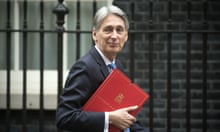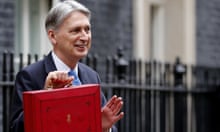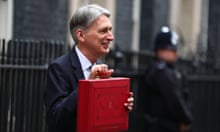With a newborn baby and a 14-month-old son to support on an annual income of less than £20,000, police community support officer Laurence Ridge, 21, was hoping for better news in the budget.
“I think the decision to abolish stamp duty for first-time buyers is reasonable but he should have announced a bigger pay rise for public sector workers – the 1% we get is miniscule compared with inflation. Building 300,000 affordable homes is nothing, spread out across the country. Where are they all?”
Laurence has been the sole breadwinner for his family ever since his partner, Caitlin, 19, was made redundant last year. The couple rent a terraced house in Lancashire with their son, Lucius, and three-week-old daughter, Emmeline, and are entitled to child tax credit and child benefit. “We’re one of those ‘just about managing’ families the government keeps saying they want to help – but the chancellor is not fussed about us. If he did, he would have cut VAT, which hurts poorer people the most.”
Q&AWhat is stamp duty?
Show

Stamp duty land tax, its proper name, is a tax paid by someone who purchases a property or piece of land in England or Northern Ireland – Scotland and Wales have their own systems. The tax is paid when the sale is completed and is based on the sum paid.
Prior to Rishi Sunak's July 2020 financial statement, there were two different points at which stamp duty was payable, depending on whether you were a first-time buyer or a mover. For movers, stamp duty had to be paid on any property costing more than £125,000.
For first-time buyers there was no stamp duty to pay unless a property cost more than £300,000. If your first home cost more than £500,000 you paid the same as a mover but if it cost less than that, you only paid tax on the part of the price that fell between £300,000 and £500,000.
The starting threshold will was increased to £500,000 on all sales taking place before 31 March 2021. The starting rate above £500,000 is 5% and will apply to the part of the sale up to £925,000.
The change will apply to second homes and additional properties. They attract a 3% surcharge, and this will still be in place.
He was glad to hear that the personal allowance will rise by £350 from April 2018, but this will only reduce his tax bill by £70 a year. He has to spend more than a third of his take-home pay on rent and 10% on diesel to cover the cost of his commute. The family has at times been short of food. “Luckily, we’ve been able to rely on our parents to help us out when we’ve struggled but I know other families who have gone to food banks.”
Caitlin lost her office admin job while she was pregnant. “If she gets another one, it will cost us so much in childcare, we wouldn’t be any better off financially. So it’s like: why bother?” He would like to see more support for mums who want to get back into work.
“I think the chancellor should have announced there would be means-tested childcare for all working parents, instead of giving parents of three- and four-year-olds 30 free hours a week, even if they earn up to £100,000 each. Those parents can afford to pay for childcare, but they get it for free while other families suffer.”
‘I’m surprised tuition fees weren’t addressed’

Recent graduate Jade Cuttle, 22, would have liked to have seen the budget address the pressing issue of student loans. “It’s interesting that nothing was mentioned about student loans. Tuition fees are the main thing that enrage young people, so I was quite surprised that it wasn’t addressed.”
She graduated from Cambridge with £44,000 in student loans. “The burden of the debt is always at the back of my mind. It feels like a life sentence.”
Given she spends thousands of pounds on train travel a year, however, she did welcome the introduction of a railcard for 26- to 30-year-olds. “Personally, I was very happy when I heard about the news of the railcard extension. In some ways, it feels like it would make more of an impact.”
Cuttle, a self-employed writer and aspiring poet from York, subsidises her income with temporary jobs including litter picking at York Maze. She typically earns between £800 and £2,000 a month – saving is not an option. “I’m having enough trouble trying to save to pay my taxes. So far I haven’t made any progress toward repaying the masses of debt that I owe.”
Student debt has already hampered her ambitions for the future. She abandoned plans for further study due to a lack of funding available for her £10,000 arts MPhil. “If you are rich then it’s fine, but I’m from a modest background. My mum can’t afford to help me as much as she’d like to right now; she is prioritising paying bills and supporting my siblings.”
She feels the impact of abolishing stamp duty on houses under £300,000 for first-time buyers would be minimal. “You have to be in a higher-paid job to even consider buying your own house. Given that I want to work in the creative industry, I don’t fall into the higher-earning bracket. I don’t think the stamp duty cut will make much difference to me.”
‘Entrepreneurs need to pay lower taxes’

Frozen meals entrepreneur Mandira Sarkar, 46, was relieved the chancellor did not announce plans to increase the tax on dividends from limited companies. Both she and her husband, Samin, 53, are self-employed. Mandira runs her own business, Surrey Spice, selling gourmet frozen Indian meals, while Samin is a strategy consultant who expects his limited company to turn over about £150,000 this year. He is planning to take dividends from the business this year, instead of paying himself a salary that would be subject to higher rate income tax. “Employed people get benefits, like paid leave,” says Mandira. “If you run your own business, you may work 24/7 and take on financial risks that employees do not have to face. Shouldn’t that mean that you pay lower taxes?”
The couple live in a £1m house in Guildford with their 15-year-old daughter Mahera, whose private school fees and extracurricular activities cost about £20,000 per year. They also pay £170 a month for medical insurance, after being appalled by waiting times for NHS appointments. “We work very hard for what we have and I think the chancellor should have made it possible for us to offset the thousands of pounds we pay in school fees and medical insurance against our tax bill, because we are not relying on the state for those services. I also think the chancellor should have raised the inheritance tax threshold so family homes are always totally exempt, and made mortgage repayments tax deductible.”
Instead of contributing to pensions, they own a buy-to-let studio in Slough. “With mortgage rates rising, it’s slowly coming to the point where the rent won’t cover the mortgage and maintenance costs.”
They aim to save 10% of their income each month, but say that with the pressures of two fledgling businesses, sometimes they do not manage to save anything at all. “That worries me because we’ve got our daughter’s university tuition fees coming up in the next two years. I’m also concerned that as we get older, by the time we reach OAP status, most benefits will be means-tested – and after 30-odd years of paying taxes, we won’t qualify.”
‘Cutting stamp duty is no help. What about childcare and pay?’

NHS clinical researcher Shanae Dennis, 25, is feeling cynical about the announcement that stamp duty will be abolished for some first-time buyers. “It’s a step in the right direction, but there are lots of other barriers stopping me getting on the property ladder. Stamp duty is only one part of the problem, and abolishing it is not this big solution. I think the chancellor has pulled that out of his hat to shut everybody up.”
She recently moved back into her parents’ house in north-west London with her four-year-old son, Jayden, so she could save up the money she was previously spending on rent and put together a house deposit. “I’ve been saving for four years and I’m a professional on what I think is a decent salary – over £40,000. Even now stamp duty has been abolished on properties costing under £300,000, it will take me another four years to be able to save up enough for a home near my family. That makes me feel insecure.”
She feels the chancellor did not do enough to reduce the financial burdens on young people. “Discounting rail fares for people under 30 is not even scratching the surface of what needs to be done. He should have frozen the interest rate on student loans or introduced a grace period where you pay nothing for the first five years after you graduate.”
She was concerned there was no increase in pay announced for lower-paid NHS workers. “I’m a manager, and nurses and medical professionals who work on the coalface are in much lower pay bands than me. I would have liked to have seen their pay increase by at least 5%, if not 10%.”
She also thinks teachers should have been given a pay rise. “I’m concerned to hear schools talking about how much they are struggling. If I were the chancellor, my priority would have been to invest in education for the next generation.”
She wishes working parents had been offered free childcare for children aged one and two, and thinks tax breaks should have been introduced for nursery owners. “I’m an ambassador for the Young Women’s Trust and I meet many young mothers who can’t get a job until their child is three because they know they can’t afford childcare. It’s shortsighted of the government not to offer more support to parents who want to get back to work.”
‘Stamp duty cut doesn’t help us – we’re above the threshold’

First-time buyer Sean Farrell’s hopes of a stamp duty giveaway were dashed in the budget – because properties in the area where he is looking in London are priced far above the new £300,000 cap on the tax.
The chancellor abolished stamp duty for first-time buyers on purchases up to £300,000 and said the benefit could be carried forward to properties worth up to £500,000.
Farrell, 32, has been saving with his fiancée to buy a home in south-west London, where even his budget of about £600,000 stretches to little more than a two-bed flat. It means the stamp duty he will pay will still be around the £20,000 mark – unless he is able to find something much cheaper.
“The budget has left us rather short. We were in the lucky position of looking at homes for £600,000 in Earlsfield, but there’s not much around for less than that. The starting price in [nearby] Wimbledon is around £800,000. We could extend our search to places much further out of London. But then we will end up having to pay much higher commuting costs for travelling into London, as well as the extra time spent on the train.
“A lot of young Londoners swung to Labour in the last election, and I thought the Conservatives would be trying to do more, but they seem to have done very little.”
Although his home purchase price will appear high to many non-Londoners, the actual cost of the mortgage on their prospective new flat, at around £2,000 month, will be little more than the £1,800 a monthSean and his partner are currently spending on rent.
Having to pay high levels of stamp duty as well as save for a deposit has been a huge struggle for first-time buyers such as Farrell. “The stamp duty is a very significant sum for us. We were getting very excited before the budget about the possible saving.”
One bonus is that they have seen house prices flatten or fall in their search area over the past year. “It’s very much the case that the agents are now calling you and saying you can get 5-10% off asking prices.”
But his single biggest concern is Brexit. He arrived in London from Dublin nearly a decade ago, while his fiancée is English, and after the budget he remains uncertain about what his status will be once the UK leaves the European Union. “I’ve lived in London since graduation. It’s a massive topic for both of us. We’ve had to look at where we want to be. I’ve even had calls from recruiters trying to lure me to Frankfurt.”
‘He should have cut VAT to help people like us’

Apprenticeships assessor Sinead Latham, 37, thinks the chancellor should have done more to help working families like hers in the budget. She and her partner Craig, 36, a duty manager at Lidl, are both basic rate taxpayers, with a total household income of £37,000. They have a three-year-old son, Eli, and live in a three-bed semi in Birmingham. “We’re not entitled to help or tax credits from the government, and childcare costs over the past few years have crippled us financially. Now, food prices are rising and we’re worried our mortgage costs are going to go through the roof. We don’t have much in the way of savings and with Brexit, we’re terrified there will be another financial crash.”
Once a quarter, to reduce their food bills, the family buys large amounts of out-of-date food online from websites such as Clearance XL. “The food gets discounted because it’s past its ‘best before’ date, but there’s nothing wrong with it. I think the chancellor should have introduced a cut in VAT to bring prices down and a levy on businesses which create food waste. It saddens me that so many people visit food banks nowadays.”
She was also disappointed the chancellor did not announce the 5% pay increase for NHS workers that unions say is needed. “My son recently had an operation and I think the NHS staff that cared for him are severely underpaid. If the chancellor doesn’t look after people who work in the NHS, they will not be there to look after us. I’m worried about how that will affect my child in the future.”
Means testing benefits for pensioners would have been a good way to raise some much-needed cash, she believes. “My dad doesn’t need his winter fuel allowance or his free TV licence. He can afford to pay for them. His generation is lucky.”
The chancellor could also have done more to target offshore tax avoiders, she thinks – closing just one loophole, relating to royalties on UK sales paid to low-tax jurisdictions, is not enough. “There are way too many of these loopholes. I pay my taxes on the money I earn in this country – why shouldn’t wealthy people do the same?”
‘There should be no penalties on mortgage interest relief’

Ryan Windsor already owns 17 properties – and he’s just 28. He started snapping up small terraced homes on the streets around him in Thetford, Norfolk, from the age of 18, building a portfolio worth about £2m today. But he says he is disappointed the chancellor will carry on the tax raid on landlords introduced by George Osborne in 2015, but is unfazed by new rules giving tenants more security.
“There should be no penalties on interest relief,” says Windsor, referring to the gradual phasing out of mortgage interest relief that began in April and will bite hardest by 2020. Hammond made no mention of changes to the rules in the budget.
“I was expecting it to stay the same. If it was brought back to what it originally was, it would have been better.”
But he welcomed moves to allow renters to enjoy longer, more secure tenancies. In the budget, Hammond said the government would talk to landlords about the barriers to offering longer tenancies.
“My average tenancy is coming up to seven years. They are mostly migrants who before were living in dirty, damp properties, sometimes 10 in a house. I also charge a little less than the going rate for around here. The tenants are nearly all from Lithuania and they just don’t want to leave.
“I’d like to have my tenants in my properties as long as possible, they seem to enjoy them. They have turned them into their home which is what I kind of want, they are happy to live there.
“Usually I spend £10,000 to £20,000 on refurbishing a home completely before letting it out. I can understand the anger some people have against landlords, but there’s good and bad ones. I’d actually be happy with more regulation of landlords – some of the places I’ve seen are horrendous.”
Brexit could have a big impact on his tenants, although he is relatively relaxed about the outlook, saying the shortage of homes in the area mean he is still likely to find tenants.
Windsor reckons the chancellor should do more to encourage entrepreneurship among the young; he comes from a working-class background, and dropped out of school before returning to study later, gaining a business management degree.
‘Hammond’s got little room to manoeuvre because of Brexit’

Melvin Wingfield, a director at precision engineering firm A&M EDM in the West Midlands, did not receive everything on his budget wish list but admitted Hammond was constrained by political concerns, notably Brexit.
“I’m neither disappointed nor elated – he’s got very little room to manoeuvre because of the decision to leave the EU,” said Wingfield.
He welcomed the commitment to apprenticeships and further education, which included an extra £20m for colleges. “The increase in apprenticeships is good news, but I would like to see them valued more, so people who don’t go to university aspire to the role.”
Hammond’s plan to allocate a further £2.3bn for investment in research and development and to increase the main R&D tax credit to 12% also received the thumbs up.
Founded in 2002 in Sandwell, with two employees and a £17,000 loan, A&M now turns over nearly £5m a year and supplies components to car firms including Jaguar Land Rover, aerospace businesses such as United Technologies, and Formula One racing teams.
Business rates are a major cost for the company, said Wingfield. So the move to bring forward by two years to next April the switch from the retail prices index to the lower consumer prices index for the annual rise was appreciated.
He had wanted to see Hammond reduce corporation tax and introduce further incentives for companies to invest in capital equipment, but accepts this could have meant tax rises elsewhere. “We need to encourage manufacturing here – the myth that we don’t manufacture needs to be crushed, manufacturing is still a very important part of the economy.”
‘I’m surprised he didn’t raise diesel prices

Like millions of other motorists, Cindy McIntyre thought she was doing the right thing by the environment when she bought her fuel-efficient diesel Nissan Qashqai in 2010.
But in recent months, the osteopath, who lives near Cambridge and uses her car to commute to her practice in Letchworth Garden City four days a week, says she has been considering switching to an electric car. “I’m really surprised the chancellor didn’t use the budget to up diesel prices, which is what I think many owners had been expecting.”
McIntyre says she spends about £35 a week on diesel filling up roughly every two weeks – giving her an annual spend of about £1,800 a year on diesel. Her car does around 40 miles per gallon. However, she says, her motivation to switch to an electric car is driven more by the air pollution argument than economics.
“Back in 2010 buying a diesel car was considered the green thing to do, but I now find myself a bit embarrassed that I am driving a polluting car. All the news on diesel in recent months has been very negative, and I’d already thought that I should be getting rid of it and buying an electric car.
“My commute is around 50 miles in total so I’d be well inside the electric car’s range plus it would sit much better with me as an osteopath who promotes well-being to be driving a car with zero emissions. We have solar panels on the house’s roof and will put more on the garage soon, so it probably also makes financial sense to move to an electric car.”
‘Stamp duty was a great result, especially for first-time buyers’

The abolition of stamp duty for properties worth up to £300,000 was a welcome surprise, sys Adrian Swan, a housebuilder.
“I thought it might be £250,000 so it was a great result, especially for first-time buyers. Overall there were some sensible things that should help the housing market.”
His company, Swan Homes, was set up eight years ago and specialises in starter homes as well as the higher end of the market, covering Leicestershire, Derby and Nottingham. It develops 15 to 20 prospects a year and employs eight people directly and 30 to 40 subcontractors.
Swan welcomed the promise of £44m of funding for the housing market, including a proposed £630m small sites fund and more money for the Home Building Fund designed to encourage independent builders. “This should encourage more smaller- and medium-sized companies back into the housing game and break the slight monopoly at the top,” he says.
But he hoped some of the promised funds would also trickle down to local authorities to allow them to put more resources into their planning departments.
He was not convinced by Hammond’s pledge to review whether developers were sitting on land rather than building houses. “I don’t believe they are sitting on it on purpose ... Lots of small developers may have owned land, had consent, then it lapsed because they didn’t want to build until the market improved.”
He is also worried about the lack of skilled workers: “We have a humongous skills shortage in this country. Brexit won’t assist this, if ... people migrate back across the Channel.”
‘I’m disappointed there was nothing for older people’

Anthony Martyn, 74, said that even though he diligently saved into private pension schemes, and that his income was higher than the average pensioner, he was only “just about managing” financially.
He was disappointed there was nothing in the budget specifically for older people, but said he was pleased to hear that inflation was “under control”, and that there would be more money for the NHS.
The budget documents did contain one bit of positive news for older people: the full basic state pension will rise from £122.30 to £125.95 a week in April 2018, while the new state pension – for men born after 6 April 1951, and women born after 6 April 1953 – will increase from £159.55 to £164.35 a week, assuming a full national insurance contributions record. Both are being increased by the “triple lock”, which means the payments rise in line with whichever is the highest of average wages – inflation, or 2.5%.
Martyn, who lives in a bungalow in a rural part of Cambridgeshire, lost his wife 15 years ago, but has caring responsibilities for two children, aged 10 and 12. He also has two grown-up children.
“I spend pretty much all I get every month – I’m by no means well-off,” he says. “My costs are very high, and I could do with more to make ends meet. I could show you my bank statements and you can see how everything goes out by direct debit. I’ve got two old cars, one of them 15 years old.”
About three years ago Martyn took out a lifetime mortgage – a form of equity release that allows older people to unlock some of the value tied up in their property – via the equity release specialist equity release firm Key Retirement, which enabled him to pay off debts. He recently released some more money, some of which has been spent on his house.
A short time ago he received a letter confirming his winter fuel payment: “It’s £200 and very handy.” But he called the pensioners’ Christmas bonus of £10 “just peanuts. It really annoys me. It should have gone up in line with inflation. When it first started it was actually worth something.” The Christmas bonus was introduced by Ted Heath’s government in 1972 at £10, and if it had risen in line with inflation since, it would be worth more than £120 today.
His biggest gripe is the planning system, which has prevented him from developing land to the side of his property that, he says, could help solve housing issues in his area. He says the council has rejected his application to build two affordable homes on the site. “It’s crazy. They have got to relax the planning rules.”








